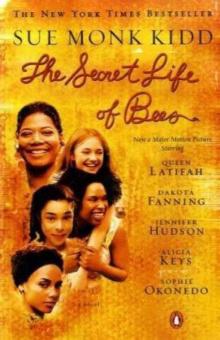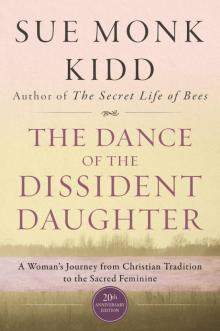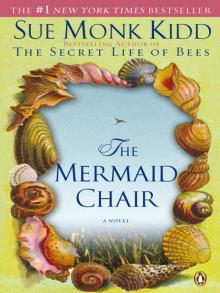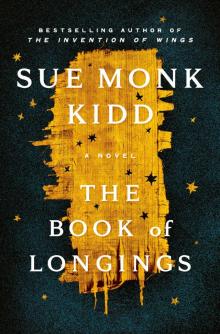- Home
- Sue Monk Kidd
The Invention of Wings: A Novel Page 3
The Invention of Wings: A Novel Read online
Page 3
When I woke, the bluish tint of the Delft tiles around the hearth gleamed with light. I sat up into the quietness. My ecstatic burst of the night before had drained away, leaving me calm and clear. I couldn’t have explained then how the oak tree lives inside the acorn or how I suddenly realized that in the same enigmatic way something lived inside of me—the woman I would become—but it seemed I knew at once who she was.
It had been there all along as I’d scoured Father’s books and constructed my arguments during our dinner table debates. Only the past week, Father had orchestrated a discussion between Thomas and me on the topic of exotic fossilized creatures. Thomas argued that if these strange animals were truly extinct, it implied poor planning on God’s part, threatening the ideal of God’s perfection, therefore, such creatures must still be alive in remote places on earth. I argued that even God should be allowed to change his mind. “Why should God’s perfection be based on having an unchanging nature?” I asked. “Isn’t flexibility more perfect than stasis?”
Father slapped his hand on the table. “If Sarah was a boy, she would be the greatest jurist in South Carolina!”
At the time, I’d been awed by his words, but it wasn’t until now, waking up in my new room, that I saw their true meaning. The comprehension of my destiny came in a rush. I would become a jurist.
Naturally, I knew there were no female lawyers. For a woman, nothing existed but the domestic sphere and those tiny flowers etched on the pages of my art book. For a woman to aspire to be a lawyer—well, possibly, the world would end. But an acorn grew into an oak tree, didn’t it?
I told myself the affliction in my voice wouldn’t stop me, it would compel me. It would make me strong, for I would have to be strong.
I had a history of enacting small private rituals. The first time I took a book from Father’s library, I’d penned the date and title—February 25, 1803, Lady of the Lake—on a sliver of paper that I wedged into a tortoise-shell hair clip and wore about surreptitiously. Now, with dawn gathering in bright tufts across the bed, I wanted to consecrate what was surely my greatest realization.
I went to the armoire and took down the blue dress Charlotte had sewed for the disastrous birthday party. Where the collar met, she’d stitched a large silver button with an engraved fleur de lis. Using the hawk bill letter opener John had left behind, I sawed it off. Squeezing it in my palm, I prayed, Please, God, let this seed you planted in me bear fruit.
When I opened my eyes, everything was the same. The room still bore patches of early light, the dress lay like a blue heap of sky on the floor, the silver button was clutched in my palm, but I felt God had heard me.
The sterling button took on everything that transpired that night—the revulsion of owning Hetty, the relief of signing her manumission, but mostly the bliss of recognizing that innate seed in myself, the one my father had already seen. A jurist.
I tucked the button inside a small box made of Italian lava rock, which I’d received one Christmastime, then hid it at the back of my dressing drawer.
Voices came from the corridor mingled with the clink-clank of trays and pitchers. The sound of slaves in their servitude. The world waking.
I dressed hurriedly, wondering if Hetty was already outside my door. As I opened it, my heart picked up its pace, but Hetty wasn’t there. The manumission document I’d written lay on the floor. It was torn in two.
Handful
My life with Miss Sarah got off on a bad left foot.
When I got to her room that first morning, the door hung open and Miss Sarah was sitting in the cold, staring at the blank wall. I stuck my head in and said, “Miss Sarah, you want me to come in there?”
She had thick little hands with stubby fingers and they went up to her mouth and spread open like a lady’s fan. Her eyes were pale and spoke plainer than her mouth. They said, I don’t want you here. Her mouth said, “… … Yes, come in… … I’m pleased to have you for my waiting maid.” Then she slumped in her chair and went back to what she was doing before. Nothing.
A ten-year-old yard slave who hadn’t done nothing but chores for Aunt-Sister never got inside the house much. And never to the top floors. What such a room! She had a bed big as a horse buggy, a dressing table with a looking glass, a desk for holding books and more books, and lots of padded chairs. The chimney place had a fire screen embroidered with pink flowers I knew came from mauma’s needle. Up on the mantel were two white vases, pure porcelain.
I looked everything over, then stood there, wondering what to do. I said, “Sure is cold.”
Miss Sarah didn’t answer, so I said louder, “SURE IS COLD.”
This snapped her from her wall-staring. “… … You could lay a fire, I guess.”
I’d seen it done, but seeing ain’t doing. I didn’t know to check the flue, and here came all this smoke swarming out like chimney bats.
Miss Sarah started throwing open windows. It must’ve looked like the house was burning cause out in the yard Tomfry yelled, “Fire, fire.”
Then everybody took it up.
I grabbed the basin of water in the dressing room used for freshening up and hurled it on the fire, which didn’t do nothing but cause the smoke to double up. Miss Sarah fanned it out the windows, looking like a ghost through all the black clouds. There was a jib door in her room that opened to the piazza, and I ran to get it open, wanting to shout to Tomfry we didn’t have a fire, but before I could yank it free, I heard missus flying round the house hollering for everybody to get out and take an armload.
After the smoke thinned to a few floating cobwebs, I followed Miss Sarah to the yard. Old Snow and Sabe had already bridled up the horses and pulled the carriages to the back in case the whole yard went down with the house. Tomfry had Prince and Eli toting buckets from the cistern. Some neighbor men had showed up with more buckets. Folks feared a fire worse than the devil. They kept a slave sitting all day up in the steeple on St. Michael’s, watching the rooftops for fire, and I worried he’d see all this smoke, ring the church bell, and the whole brigade show up.
I ran to mauma who was bunched with the rest of ’em. The stuff they thought worth saving was heaped in piles by their feet. China bowls, tea caddies, record books, clothes, portraits, Bibles, brooches, and pearls. Even a marble bust was sitting out there. Missus had her gold-tip cane in one hand and a silver cigar holder in the other.
Miss Sarah was trying to cut through the frantics to tell Tomfry and the men there wasn’t a fire to throw their water on, but by the time she dragged the words out of her mouth, the men had gone back to hauling water.
When it got worked out what’d happened, missus went into a fury. “Hetty, you incompetent fool!”
Nobody moved, not even the neighbor men. Mauma moved over and tucked me behind her, but missus jerked me out front. She brought the gold-tip cane down on the back of my head, worst blow I ever got. It drove me to my knees.
Mauma screamed. So did Miss Sarah. But missus, she raised her arm like she’d go at me again. I can’t describe proper what came next. The work yard, the people in it, the walls shutting us in, all that fell away. The ground rolled out from under me and the sky billowed off like a tent caught in the wind. I was in a space to myself, somewhere time can’t cross. A voice called steady in my head, Get up from there. Get up from there and look her in the face. Dare her to strike you. Dare her.
I got on my feet and poked my face at her. My eyes said, Hit me, I dare you.
Missus let her arm drop and stepped back.
Then the yard was round me again and I reached up and felt my head. A lump was there the size of a quail egg. Mauma reached over and touched it with her fingertip.
The rest of that God-forsook day every woman and girl slave was made to drag clothes, linens, rugs, and curtains from every room upstairs out to the piazza for airing-out. Everyone but mauma and Binah showered me with looks of despising. Miss Sarah came up there wanting to help and started hauling with the rest of us. Every time I turned round
, she was looking at me like she’d never seen me before in her life.
Sarah
I took meals alone in my room for three full days as a protest against owning Hetty, though I don’t think anyone much noticed. On the fourth day, I swallowed my pride and arrived in the dining room for breakfast. Mother and I hadn’t spoken of the doomed manumission document. I suspected she was the one who’d torn it into two even pieces and deposited them outside my room, thereby having the Last Word without uttering a syllable.
At the age of eleven, I owned a slave I couldn’t free.
The meal, the largest of the day, had long been under way—Father, Thomas, and Frederick had already left in pursuit of school and work, while Mother, Mary, Anna, and Eliza remained.
“You are late, my dear,” Mother said. Not without a note of sympathy.
Phoebe, who assisted Aunt-Sister and looked slightly older than myself, appeared at my elbow, emanating the fresh odors of the kitchen house—sweat, coal, smoke, and an acrid fishiness. Typically, she stood by the table and swished the fly brush, but today she slid a plate before me heaped with sausages, grit cake, salted shrimp, brown bread, and tapioca jelly.
Attempting to lower a quivery cup of tea beside my plate, Phoebe deposited it on top my spoon, causing the contents to slosh onto the cloth. “Oh missus, I sorry,” she cried, whirling toward Mother.
Mother blew out her breath as if all the mistakes of all the Negroes in the world rested personally upon her shoulders. “Where is Aunt-Sister? Why, for heaven’s sake, are you serving?”
“She showing me how to do it.”
“Well, see that you learn.”
As Phoebe rushed to stand outside the door, I tried to toss her a smile.
“It’s nice of you to make an appearance,” Mother said. “You are recovered?”
All eyes turned on me. Words collected in my mouth and lay there. At such moments, I used a technique in which I imagined my tongue like a slingshot. I drew it back, tighter, tighter. “… … I’m fine.” The words hurled across the table in a spray of saliva.
Mary made a show of dabbing her face with a napkin.
She’ll end up exactly like Mother, I thought. Running a house congested with children and slaves, while I—
“I trust you found the remains of your folly?” Mother asked.
Ah, there it was. She had confiscated my document, likely without Father knowing.
“What folly?” Mary said.
I gave Mother a pleading look.
“Nothing you need concern yourself with, Mary,” she said, and tilted her head as if she wanted to mend the rift between us.
I slumped in my chair and debated taking my cause to Father and presenting him with the torn manumission document. I could think of little else for the rest of the day, but by nightfall, I knew it would do no good. He deferred to Mother on all household matters, and he abhorred a tattler. My brothers never tattled, and I would do no less. Besides, I would’ve been an idiot to rile Mother further.
I countered my disappointment by conducting vigorous talks with myself about the future. Anything is possible, anything at all.
Nightly, I opened the lava box and gazed upon the silver button.
Handful
Missus said I was the worst waiting maid in Charleston. She said, “You are abysmal, Hetty, abysmal.”
I asked Miss Sarah what abysmal means and she said, “Not quite up to standard.”
Uh huh. I could tell from missus’ face, there’s bad, there’s worse, and after that comes abysmal.
That first week, beside the smoke, I spilled lamp oil on the floor leaving a slick spot, broke one of those porcelain vases, and fried a piece of Miss Sarah’s red hair with a curling tong. Miss Sarah never tattled. She tugged the rug over to cover the oily place, hid the broke porcelain in a storeroom in the cellar, and cut off her singed hair with the snuffer we used to snip the candle wick.
Only time Miss Sarah rang her bell for me was if missus was headed our way. Binah and her two girls, Lucy and Phoebe, always sang out, “The cane tapping. The cane tapping.” Miss Sarah’s warning bell gave me some extra lead on my rope, and I took it. I would rove down the hallway to the front alcove where I could see the water in the harbor float to the ocean and the ocean roll on till it sloshed against the sky. Nothing could hold a glorybound picture to it.
First time I saw it, my feet hopped in place and I lifted my hand over my head and danced. That’s when I got true religion. I didn’t know to call it religion back then, didn’t know Amen from what-when, I just knew something came into me that made me feel the water belonged to me. I would say, that’s my water out there.
I saw it turn every color. It was green one day, then brown, next day yellow as cider. Purple, black, blue. It stayed restless, never ceasing. Boats coming and going on top, fishes underneath.
I would sing these little verses to it:
Cross the water, cross the sea
Let them fishes carry me.
If that water take too long,
Carry me on, Carry me on.
After a month or two, I was doing more things right in the house, but even Miss Sarah didn’t know some nights I left my post by her door and watched the water all night long, the way it broke silver from the moon. The stars shining big as platters. I could see clean to Sullivan’s Island. I pined for mauma when it was dark. I missed our bed. I missed the quilt frame guarding over us. I pictured mauma sewing quilts by herself. I would think about the gunny sack stuffed with feathers, the red pouch with our pins and needles, my pure brass thimble. Nights like that, I hightailed it back to the stable room.
Every time mauma woke and found me in bed with her, she had a fit, saying all the trouble there would be if I got caught, how I already lived too far out on missus’ bad side.
“Ain’t nothin’ good gon come from you wandering off like this,” she said. “You got to stay put on your quilt. You do that for me, you hear me?”
And I’d do it for her. Least for a few days. I’d lay on the floor in the hall, trying to stay warm in the draft, twisting round in search of the softest floorboard. I could make do with that misery and take my solace from the water.
Sarah
On a bleary morning in March, four months after the calamity of my eleventh birthday, I woke to find Hetty missing, her pallet on the floor outside my room crumpled with the outline of her small body. By now, she would’ve been filling my basin with water and telling me some story or other. It surprised me that I felt her absence personally. I missed her as I would a fond companion, but I fretted for her, too. Mother had already taken her cane to Hetty once.
Finding no trace of her in the house, I stood on the top step by the back door, scanning the work yard. A thin haze had drifted in from the harbor, and overhead the sun glinted through it with the dull gold of a pocket watch. Snow was in the door of the carriage house, repairing one of the breeching straps. Aunt-Sister straddled a stool by the vegetable garden, scaling fish. Not wishing to rouse her suspicions, I ambled to the porch of the kitchen house where Tomfry was handing out supplies. Soap to Eli for washing the marble steps, two Osnaburg towels to Phoebe for cleaning crystal, a coal scoop to Sabe for re-supplying the scuttles.
As I waited for him to finish, I let my eyes drift to the oak in the back left corner. Its branches were adorned with tight buds, and though the tree bore little resemblance to its summer visage, the memory of that long-ago day returned: sitting straddle-legged on the ground, the hot stillness, the green-skinned shade, arranging my words with marbles, Sarah Go—
I looked away to the opposite side of the yard, and it was there I saw Hetty’s mother, Charlotte, walking beside the woodpile, bending now and then to pick up something from the ground.
Arriving behind her unseen, I noticed the tidbits she scavenged were small, downy feathers. “… … Charlotte—”
She jumped and the feather between her fingers fluttered off on the sea wind. It flitted to the top of the high brick wall
that enclosed the yard, snagging in the creeping fig.
“Miss Sarah!” she said. “You scared the jimminies out of me.” Her laugh was high-pitched and fragile with nerves. Her eyes darted toward the stable.
“… … I didn’t mean to startle you … I only wondered, do you know where—”
She cut me off, and pointed into the woodpile. “Look way down ’n there.”
Peering into a berth between two pieces of wood, I came face to face with a pointy-eared brown creature covered with fuzz. Only slightly bigger than a hen’s chick, it was an owl of some sort. I drew back as its yellow eyes blinked and bore into me.
Charlotte laughed again, this time more naturally. “It ain’t gon bite.”
“… … It’s a baby.”
“I came on it a few nights back. Poor thing on the ground, crying.”
“… … Was it … hurt?”
“Naw, just left behind is all. Its mauma’s a barn owl. Took up in a crow’s nest in the shed, but she left. I’m ’fraid something got her. I been feeding the baby scraps.”
My only liaisons with Charlotte had been dress fittings, but I’d always detected a keenness in her. Of all the slaves Father owned, she struck me as the most intelligent, and perhaps the most dangerous, which would turn out to be true enough.
“… … I’ll be kind to Hetty,” I said abruptly. The words—remorseful and lordly—came out as if some pustule of guilt had disgorged.
Her eyes flashed open, then narrowed into small burrs. They were honey colored, the same as Hetty’s.
“… … I never meant to own her … I tried to free her, but … I wasn’t allowed.” I couldn’t seem to stop myself.
Charlotte slid her hand into her apron pocket, and silence welled unbearably. She’d seen my guilt and she used it with cunning. “That’s awright,” she said. “Cause I know you gon make that up to her one these days.”
The letter M clamped on to my tongue with its little jaws. “… … … M-m-make it up?”

 The Secret Life of Bees
The Secret Life of Bees The Invention of Wings
The Invention of Wings Traveling With Pomegranates
Traveling With Pomegranates The Dance of the Dissident Daughter
The Dance of the Dissident Daughter The Mermaid Chair
The Mermaid Chair The Book of Longings
The Book of Longings The Invention of Wings: A Novel
The Invention of Wings: A Novel The Invention of Wings: With Notes
The Invention of Wings: With Notes